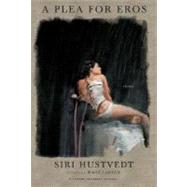A Plea for Eros Essays
, by Hustvedt, Siri- ISBN: 9780312425531 | 0312425538
- Cover: Paperback
- Copyright: 12/27/2005
From the author of the international bestseller What I Loved, a provocative collection of autobiographical and critical essays about writing and writers. Whether her subject is growing up in Minnesota, cross-dressing, or the novel, Hustvedt's nonfiction, like her fiction, defies easy categorization, elegantly combining intellect, emotion, wit, and passion. With a light touch and consummate clarity, she undresses the cultural prejudices that veil both literature and life and explores the multiple personalities that inevitably inhabit a writer's mind. Is it possible for a woman in the twentieth century to endorse the corset, and at the same time approach with authority what it is like to be a man? Hustvedt does. Writing with rigorous honesty about her own divided self, and how this has shaped her as a writer, she also approaches the works of others--Fitzgerald, Dickens, and Henry James--with revelatory insight, and a practitioner's understanding of their art. Siri Hustvedt 's essays on art, Mysteries of the Rectangle, are available from Princeton University Press. She lives in Brooklyn, New York, with her husband, Paul Auster. Whether her subject is growing up in Minnesota, cross-dressing, or the novel, Hustvedt''s nonfiction, like her fiction, defies easy categorization, combining intellect, emotion, wit, and passion. She undresses the cultural prejudices that veil both literature and life and explores the multiple personalities that inevitably inhabit a writer''s mind. Is it possible for a woman in the twentieth century to endorse the corset, and at the same time approach with authority what it is like to be a man? Hustvedt does. Writing with rigorous honesty about her own divided self, and how this has shaped her as a writer, she also approaches the works of others'”Fitzgerald, Dickens, and Henry James'”with revelatory insight, and a practitioner''s understanding of their art. "Writer and art critic Siri Hustvedt''s impressive third novel, What I Loved , established her as one of the most talented voices in contemporary fiction. Rich in passion and ideas, the novel brings to life characters of extraordinary depth and humanity and conjures up paintings and art installations so vividly that one can almost touch them. Hustvedt brings the same visual power, sensuality and intelligence to her collection of essays A Plea for Eros . Written over a decade (1995-2005), these lively personal and literary pieces cover a dizzying range of subjects'”autobiography, sexuality, wearing a corset, Sept. 11, the actor Franklin Pangborn, F. Scott Fitzgerald, Henry James and Dickens. What unifies and makes this collection so compelling is the way in which Hustvedt weaves evocative memories and stories with her intellectual meditations. In the book''s finest piece, ''Yonder,'' she lovingly re-creates the three places in her life: Minnesota, where she was born and rebelled against a culture of conformity; Norway, her mother''s and paternal grandparents'' native country, where she spent three happy years; and New York, which she embraced when she moved there in 1978 to go to graduate school at Columbia and where she now lives with her husband, the writer Paul Auster. Her recollections bloom into reflections on how places live in our minds or are imagined to illustrate a story, and on the nature of memory and the imagination. The imagination and fiction, she muses, are a kind of memory or ''remembering what never happened.'' Her observation that we use ''I see'' for ''I understand'' because we create pictures to understand the world also describes the theory behind her writing and what makes her prose so alive: She distills an idea from an image or illuminates her concepts with stories . . . Hustvedt is not afraid to express her deep love for her family or share her vulnerabilities. In the autobiographical ''Extracts from a Story of the Wounded Self,'' we learn that she was frail at birth, that she suffers from severe migraine headaches and that she carrie







